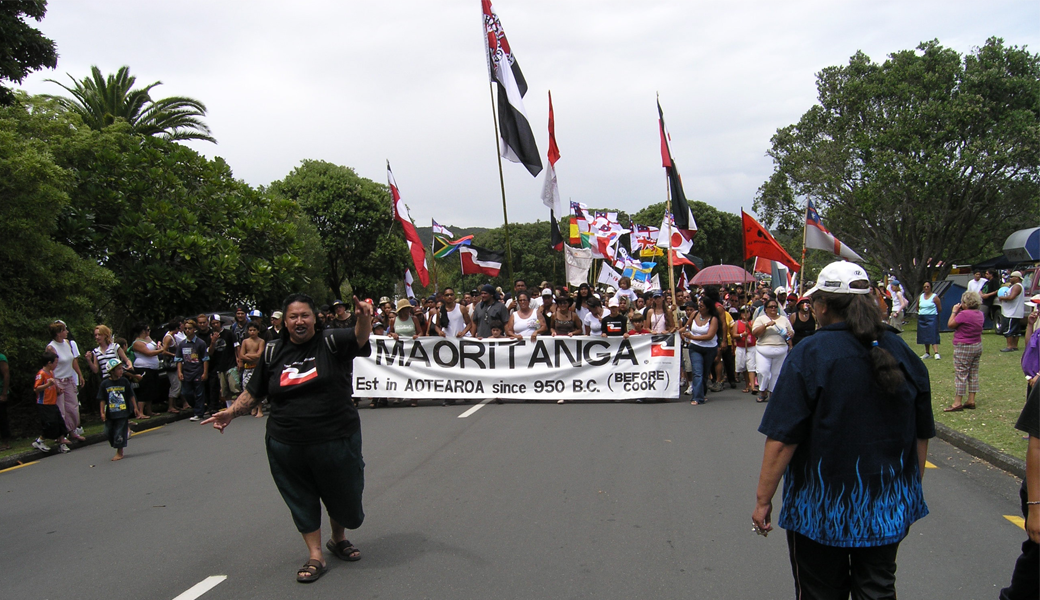Protests and political bunfights at Waitangi are nothing new. They have helped shape our nation and should be celebrated, not demonised.
Monday 6th February is an important day. Not only is it Bob Marley’s birthday, but it is New Zealand’s national holiday.
Waitangi Day marks the day The Treaty of Waitangi was signed between Māori and the British Crown in 1840. In recent years it has also come to symbolise the progress we have made towards becoming a more bicultural nation. It is a significant day. Yet, every year there is talk of renaming it, ‘New Zealand Day’.
People worry about the inevitable protests. This year, Prime Minister, Bill English, led the chorus by declining an invitation to the official celebrations. Others argue we need a day that celebrates our oneness. Some have even suggested we follow Australia where they have a more upbeat mood on their national day.
I, personally, disagree that we should change Waitangi Day and find it alarming that we would look to Australia for ways to commemorate our nationhood.
One Love, One Heart. Let’s get together and feel alright
From the very first celebration in 1934, Waitangi Day has meant different things to different people. For some it is a holiday, for others a chance to reflect on the impact of colonisation. Yet the myth prevails that we are all one people and it seems to be at the heart of many of the arguments for a new national day.
Most recently Pamela Stirling argued New Zealanders could learn a thing or two from the way Australians celebrate their National Day.
I find it particularly alarming that New Zealanders would look to Australia for ways to commemorate our nationhood. Australia Day may have a more festive feel but (as an outsider) it appears there is little space for indigenous voices in the official celebrations. Aboriginal people find Australia Day a painful reminder of all they lost, many calling it instead ‘Invasion Day’ or ‘Survival Day’.
In this great future, you can’t forget your past
Since the 1970s protests in and around Waitangi Day have been instrumental in gaining recognition for Māori. The Ngā Tamatoa movement and 1984 Hīkoi in particular brought Māori rights to the forefront of our national consciousness.
Today there is a special tribunal to hear Māori land claims. There has been redress for the loss of land, culture and heritage that Māori suffered following colonisation. Māori is an official language and indigenous culture is alive and celebrated in schools, workplaces and homes.
If we rename Waitangi Day we run the risk of undoing the great progress we have made towards becoming a bicultural nation.
Get up, stand up! Don’t give up the fight!
That Waitangi Day provides a forum for Māori to voice dissent should not be seen as ‘cringe-worthy’, rather it is something to be proud of. Protest is a healthy part of any democracy and a crucial way for minorities to get their voice heard.
As Madeleine de Young writes: “Protest is an opportunity to learn from each other and to change. In Aotearoa, protest is how Māori have fought to regain their language, lands and right to exist as tangata whenua in this country.”
Waitangi Day may force us to reflect on painful memories and have difficult conversations. But it is also a chance to celebrate the more tolerant, inclusive country we live in. There are a range of ways we do this – from festivals, family time, official ceremonies and protests. Some of us even spend the day enjoying the music of that most famous Rastafarian, Bob Marley.
Australian expat Angela Cuming wrote recently when comparing Australian and New Zealand celebrations: “I hope New Zealand will leave Waitangi Day as it is. Be proud that it means different things to different people, that some will use the day to protest, some to reflect and some, like me, to celebrate what an amazing, diverse country this is.” I totally agree.

